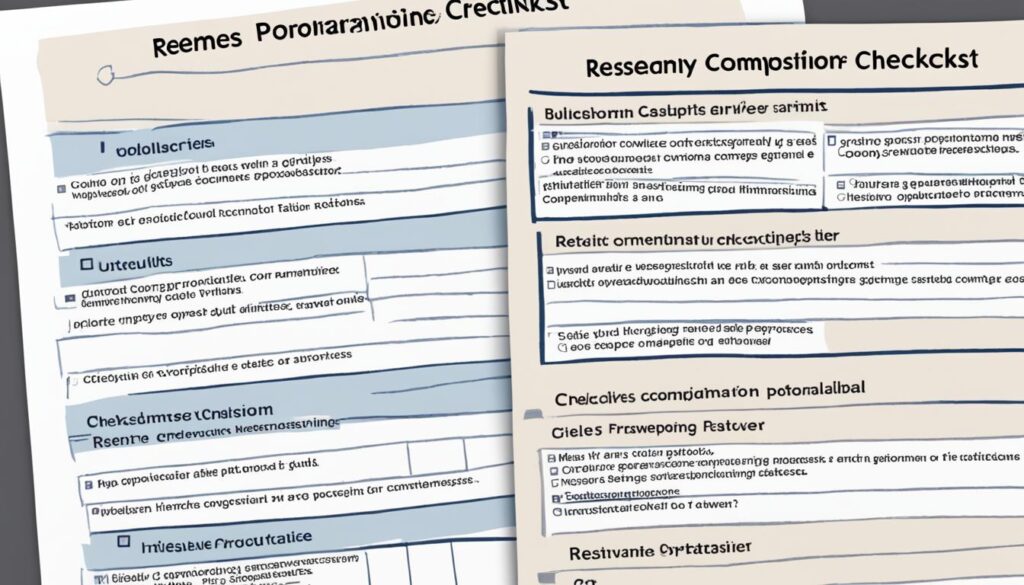The job market has evolved, traditional interview techniques are less effective. To truly impress, embrace authenticity and showcase your unique value.
Interviewers easily spot canned responses. Engage genuinely and confidently throughout. Authenticity lets them know the real you beyond your resume.
Be honest about strengths, weaknesses, and past experiences. Share specific examples demonstrating personal growth and ability to learn from challenges.
Storytelling showcases problem-solving skills, resilience, and growth mindset. Prepare compelling narratives about overcoming adversity or learning from failure.
These insights set you apart, resonating with interviewers more than memorized answers.
Key Takeaways:
- Authenticity is crucial for standing out in job interviews
- Engage genuinely and confidently throughout the interview process
- Be honest and self-aware about strengths, weaknesses, and past experiences
- Share specific moments and concise examples that demonstrate personal growth
- Use storytelling to showcase problem-solving skills, resilience, and growth mindset
Authenticity: The Key to Interview Success
In job interviews, authenticity is undervalued. Thorough prep is vital, but staying true to yourself is equally crucial. Interviewers detect inauthentic behavior, labeling candidates as behaviorally neutral despite technical skills.
Envision a hired candidate lacking authenticity during interviews. Compatibility issues with managers and colleagues may arise, causing job dissatisfaction and job hunting restarts. Thus, candidates must prioritize authenticity throughout interviews.
Thorough preparation builds interview confidence and authenticity. Researching the company, culture, and role enhances genuine interest demonstration. This allows authentic responses aligning with company needs and values.
Authenticity fosters interviewer trust and connection. Genuine candidates build rapport effectively, showcasing communication and collaboration skills. Storytelling with specific examples positively impacts interviewers.
Authentic interviews involve active listening and engagement. Fully focusing on questions and providing relevant, thoughtful responses demonstrates effective communication and contribution.
Nervousness is manageable through authentic techniques like deep breathing and positive self-talk. Candidates remain calm, allowing their authentic selves to shine. Appropriate etiquette conveys confidence and professionalism.
| Interview Dos | Interview Don’ts |
|---|---|
| Research the company and role thoroughly | Provide canned or memorized responses |
| Be genuine and true to yourself | Present an inauthentic version of yourself |
| Share specific examples and stories | Give vague or general answers |
| Actively listen and engage in the conversation | Dominate the conversation or interrupt the interviewer |
| Practice relaxation techniques to manage nerves | Allow nervousness to overshadow your authentic self |
Post-interview, personalized thank-you emails leave positive impressions, demonstrating authentic interest and appreciation. This simple follow-up sets candidates apart and reinforces established connections.
Continuous learning and self-reflection improve interview skills over time. Assessing performance and identifying improvement areas refines approaches and increases authentic self-presentation comfort.
Embracing authenticity in interviews powerfully boosts success. Being true to yourself builds genuine connections, demonstrates value, and ultimately finds roles aligning with skills, values, and aspirations.
Preparing for an Authentic Interview
To shine in a job interview, preparation is vital. A well-prepared candidate shows genuine interest, boosting success chances. 83% of interviewers believe being well-prepared is key. Preparing allows tailoring responses to align with company needs, making a lasting impression.

Research the Company and Role
Research the company and role thoroughly. 67% of candidates researching thoroughly are more likely hired. Review the website, mission, news, and job description. Understanding goals and how your skills contribute is crucial.
Reflect on Your Strengths and Weaknesses
Be honest and self-aware about strengths and weaknesses. Identify examples showcasing strengths contributing to success. For weaknesses, discuss steps taken to improve, demonstrating growth mindset.
| Common Interview Questions | Preparation Tips |
|---|---|
| Tell me about yourself | Prepare a concise summary of your background, skills, and career goals |
| What are your strengths? | Identify 3-4 strengths that align with the job requirements and provide examples |
| What are your weaknesses? | Choose a weakness that you have actively worked to improve and discuss your progress |
| Why do you want to work for our company? | Research the company’s mission, values, and culture to demonstrate your genuine interest |
Craft Compelling Stories and Examples
Prepare compelling stories showcasing skills, experiences, and accomplishments. Focus on problem-solving, leadership, or overcoming challenges. Use STAR (Situation, Task, Action, Result) to structure effectively.
According to a study, the impression made during an interview, including poise, attitude, social skills, and communication, can outweigh actual credentials.
44% of interviewers consider authenticity most important. Embrace your unique qualities, experiences, and perspective to secure the job.
Showcasing Your Unique Value Proposition
During job interviews, demonstrate your unique skills and experiences. Position yourself as solution to organization’s challenges. Highlight relevant achievements, providing evidence of capabilities.
For example, if you increased sales by 20% in the first year by introducing a new marketing strategy, share this achievement. It shows your ability to drive results and innovate.
If you cut customer service call times by 30% by implementing a new CRM system, or led a project that raised $50,000 through crowdfunding, highlight these achievements. They showcase your problem-solving skills and leadership abilities.
When discussing achievements, be specific and concise. Focus on key details illustrating strengths and contributions. Use STAR method to structure responses, making a lasting impression.
Align Your Skills with the Company’s Needs
Research the company and role to tailor responses. Demonstrate how skills and experiences align with organization’s needs. Show genuine interest in contributing to company’s success.
In interviews, focus on relevant skills and experiences. For example, if applying for marketing role and boosted social media engagement by 40% using targeted ads and engaging content, highlight this achievement. Explain how you can apply similar strategies to help company reach marketing goals.
Highlight Your Most Relevant Achievements
Choose examples demonstrating ability to drive results, solve problems, and make positive impact. If managed team that completed major project early and under budget, highlight this achievement to showcase leadership skills and efficiency.
| Achievement | Impact |
|---|---|
| Reduced turnover rate by 15% in six months | Created a better work environment, leading to increased employee satisfaction and retention |
| Implemented bootstrapping methods that saved $10,000 | Demonstrated resourcefulness and financial savvy, contributing to the company’s bottom line |
| Designed an employee training program that increased productivity by 25% | Showed the ability to identify areas for improvement and develop effective solutions to enhance performance |
Provide specific details and quantify results. This approach helps interviewer understand significance of contributions, making accomplishments memorable.
Research shows that candidates who effectively showcase their personal brand in job interviews have a 40% higher chance of landing the position compared to those who do not emphasize their personal brand.
Maintain professionalism: eye contact, firm handshake, enthusiasm. Combining unique value proposition with excellent communication skills and demeanor increases chances of interview success.
Addressing Weaknesses and Challenges
Job interviews often involve discussing weaknesses and challenges. Employers assess a candidate’s self-awareness, honesty, and ability to improve. Approach these questions with authenticity and growth mindset.

Be Honest and Self-Aware
Be upfront about areas for improvement. Focus on professional weaknesses, not personal traits. Avoid dwelling on failures or blaming others.
Common weaknesses candidates may address:
- Perfectionism and being overly self-critical
- Time management struggles
- Communication challenges
- Difficulty delegating tasks
- Work-life balance concerns
Demonstrate Growth and Learning
Emphasize steps taken to overcome the issue or learn from experience. Discuss attending workshops, seeking feedback, or taking courses.
Use the STAR method to structure responses effectively. Practice and polish answers to demonstrate potential and commitment to growth.
| Industry | Experience Level | Common Interview Questions |
|---|---|---|
| Marketing | 1-5 years | Describe a time when you failed to meet a deadline and how you handled it. |
| Sales | 5-10+ years | How do you handle rejection or objections from potential clients? |
| Software Engineering | 0-1 years | Discuss a coding project that challenged you and how you overcame the difficulties. |
| Human Resources | 1-5 years | Share an instance when you had to deliver difficult feedback to an employee. |
By addressing weaknesses and challenges honestly, with self-awareness and growth focus, candidates showcase authenticity and potential for personal and professional development.
Building Rapport and Connection
Building rapport with the interviewer is crucial. Maintain eye contact. This shows engagement and interest. Use positive body language. Smile and nod to create a relaxed atmosphere.
Subtly mirror the interviewer’s body language. This demonstrates like-mindedness. However, avoid overusing this technique as it may seem insincere.
Actively listen and respond thoughtfully. This prevents misunderstandings and shows engagement. Smiling is highlighted as the best way to show enthusiasm.
According to hiring managers, one of the biggest aspects missing from interviews is enthusiasm, with smiling being highlighted as the best way to show enthusiasm during an interview.
Ask thoughtful questions about the company and role. Research beforehand to showcase enthusiasm.
- Maintain appropriate eye contact throughout the interview
- Use positive body language, such as smiling and nodding
- Actively listen to the interviewer’s questions and respond thoughtfully
- Ask relevant questions about the company and the role
- Subtly mirror the interviewer’s body language to demonstrate like-mindedness
Maintain professionalism. Dress appropriately, arrive on time, and offer a firm handshake. Avoid controversial topics like politics or religion.
| Rapport-Building Technique | Impact on Interview Success |
|---|---|
| Maintaining eye contact | Shows engagement and active listening |
| Smiling and nodding | Creates a comfortable and relaxed atmosphere |
| Asking relevant questions | Demonstrates genuine interest and enthusiasm |
| Mirroring body language | Showcases like-mindedness and aids in connection |
Building rapport through appropriate techniques creates a memorable impression. It establishes trust and demonstrates potential fit within the company culture.
Mastering Interview Skills
Preparing for job interviews is crucial. Research the company beforehand to showcase interest. This helps answer questions effectively.
Practice Active Listening
Active listening involves engaging with questions. Pay attention to words and body language. Provide relevant, thoughtful responses.
Use the STAR method to structure achievements. Be specific, quantify results, emphasize contributions. This demonstrates communication skills.
Ask Thoughtful Questions
Asking insightful questions shows interest. It allows understanding the role and company better.
Prepare questions about culture, goals, expectations. This showcases curiosity and critical thinking.
Maintain Positive Body Language
Body language creates a positive impression. Sit up straight, make eye contact, use hand gestures.
A firm handshake and appropriate posture are crucial. It establishes connection and interpersonal skills.
| Interview Skill | Importance | Impact on Success |
|---|---|---|
| Active Listening | Demonstrates engagement and understanding | Helps provide relevant and effective responses |
| Asking Thoughtful Questions | Shows interest and curiosity in the role and company | Distinguishes candidates and showcases critical thinking |
| Positive Body Language | Conveys confidence and engagement | Creates a strong first impression and connection with the interviewer |
Mastering these skills enhances interview performance. Practice and self-reflection are key. Evaluate yourself after interviews to improve.
The Cost of Inauthenticity in Interviews
Being inauthentic in job interviews can have severe consequences. Presenting a false version of oneself risks misaligning with the company’s culture and values. This can lead to decreased job satisfaction and poor performance after being hired.
The Wall Street Journal reports authentic candidates provide more details, context, and acknowledge mistakes. Employers verify unemployment periods during background checks, emphasizing honesty about job history.
Misalignment with Company Culture
Inauthentic candidates risk being hired into misaligned company cultures. This can cause difficulty adapting to expectations, strained relationships, reduced productivity, and increased burnout likelihood.
Aparajit’s case at Equestra exemplifies inauthenticity’s consequences. He forged academic credentials and had integrity issues at Marvel. His lack of authenticity misaligned with Equestra’s ethical environment, prompting resignation.
Decreased Job Satisfaction and Retention
Inauthentic interviews can result in higher turnover rates. Employees feeling misled or unsupported are more likely to leave. Inauthenticity affects team dynamics, productivity, and company success.
Research shows hiring managers perceive candidates addressing company weakpoints upfront as honest and willing to improve.
Post-COVID-19, being transparent about layoff experiences demonstrates resilience and adaptability, valued qualities in today’s changing business landscape.
| Consequences of Inauthentic Interviews | Impact on the Individual | Impact on the Organization |
|---|---|---|
| Misalignment with Company Culture | Difficulty adapting, strained relationships, reduced productivity | Decreased team cohesion, lower overall performance |
| Decreased Job Satisfaction | Increased stress, burnout, and likelihood of leaving the job | Higher turnover rates, increased hiring and training costs |
| Reduced Retention | Frequent job changes, gaps in employment history | Loss of institutional knowledge, decreased stability and continuity |
Prioritizing authenticity in interviews avoids costly pitfalls, building a foundation for long-term workplace success and satisfaction.
Embracing Authenticity in the Hiring Process
In the competitive job market, embracing authenticity is crucial. By fostering transparency, companies attract top talent aligning with values and culture.
This leads to better hiring decisions, improved team dynamics, and increased employee retention. When employers prioritize authenticity, they create a positive brand image resonating with candidates.
Benefits for Employers
Conducting authentic interviews provides accurate assessments of skills, experiences, and potential fit. Encouraging candidates’ true selves gives deeper insights into motivations, work ethic, and problem-solving.
This transparent approach enables informed decisions, reducing mismatched hires and fostering cohesive work environments. Authentic interviews contribute to positive employer branding, attracting talent valuing transparency.
Benefits for Job Seekers
Embracing authenticity lets job seekers showcase unique strengths, experiences, and passion. Presenting genuine selves differentiates and leaves lasting impressions.
Authenticity builds trust and credibility through open discussions of accomplishments, challenges, and growth mindset. This aligns opportunities with values, goals, and work style for greater satisfaction.
Embracing authenticity empowers confident navigation of the hiring process, leading to fulfilling experiences. Job seekers can thrive by staying true to themselves.
FAQ
What are some common interview questions?
Common interview questions include “Tell me about yourself,” “What are your strengths and weaknesses?”, “Why work for our company?”, and “Describe a challenging situation you overcame.” Thoughtful, authentic responses showcase your fit.
How can I prepare for behavioral and situational interview questions?
Reflect on past experiences showcasing skills, problem-solving, and growth mindset. Practice articulating concise stories focusing on actions and results. Research common questions in your industry.
What should I wear to a job interview?
Research the company culture and dress code. Opt for professional, well-fitted, neutral-colored clothing. Avoid overly casual or revealing outfits. Ensure your outfit is clean and pressed.
How important is body language during an interview?
Body language conveys confidence, engagement, and authenticity. Maintain good posture, appropriate eye contact, and natural gestures. Smile genuinely and nod while listening. Avoid crossed arms, fidgeting, or appearing distracted.
Should I send a thank-you email after the interview?
Yes, send a thank-you email within 24 hours. Express gratitude, reiterate interest, and highlight key points reinforcing qualifications. It demonstrates follow-through, attention to detail, and enthusiasm.
How can I build rapport with the interviewer?
Smile warmly, maintain eye contact, and use active listening skills. Ask thoughtful questions about the company, role, and interviewer’s experiences. Establish a personal connection to stand out.
What should I do if I experience interview anxiety?
Thoroughly prepare by researching the company and practicing responses. Engage in relaxation techniques like deep breathing or meditation. Visualize success and focus on the opportunity’s positive aspects.
How can I authentically discuss my weaknesses during an interview?
Be honest and self-aware, focusing on areas you’re actively improving. Choose weaknesses that don’t conflict with role requirements. Emphasize steps taken to address challenges and commitment to growth.



